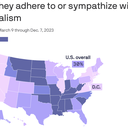Poll: Vast majority of Americans cool to Christian nationalism as its influence grows

About two-thirds of Americans reject or are skeptical about Christian nationalism despite its rising influence that's shaping education, immigration and health care policies, a new survey finds.
Why it matters: Some Republicans are openly expressing Christian nationalist views, which have ranged from calls for more religion in public schools to book bans and even suggestions that democracy should die.
- This once-fringe ideology has become prevalent in some deeply red states at a time when the nation overall is increasingly diverse and less religious.
The big picture: The new data from the nonpartisan Public Religion Research Institute's American Values Atlas come days after the Alabama Supreme Court ruled that frozen embryos should receive legal protections as "unborn life" — and cited Christianity in its reasoning.
Zoom in: 7 out of 10 Americans said they were rejecters (30%) or skeptics (37%) of Christian nationalism, the PRRI survey said.
- In California, New York and Virginia, more than 75% of respondents said they were rejecters or skeptics.
Yes, but: In five deeply red states, at least 45% of respondents said they were adherents or sympathizers of Christian nationalism: North Dakota (50%), Mississippi (50%), Alabama (47%), West Virginia (47%) and Louisiana (46%).
- States with the highest levels of support for Christian nationalism form a horseshoe shape, starting in the upper Midwest, dipping down into the deep South, and then through the Appalachian Mountains.
Republicans (55%) are more than twice as likely as independents (25%) and three times more likely than Democrats (16%) to hold Christian nationalist views, the survey found.
- Majorities of two religious groups hold Christian nationalist beliefs: white evangelicals (66%) and Hispanic evangelicals (55%). Both groups are strong supporters of former President Trump, other polls have indicated.
Between the lines: Christian nationalism is a set of beliefs centered around white American Christianity's dominance in most aspects of life in the United States.
- Many Christian nationalists believe the federal government should declare the U.S. a Christian nation.
- Many also believe U.S. laws should be based on Christian values and that God has called Christians to exercise dominion over all areas of American society.
What they're saying: "It's really a claim for an ethno-religious state, and so there's nothing democratic about that worldview," Robert P. Jones, president and founder of PRRI, tells Axios.
- Jones said some Christian nationalists view political foes as evil or demonic rather than as fellow citizens with different opinions, and see them as needing to be conquered.
The intrigue: Tom Parker, chief justice of Alabama's Supreme Court, quoted the Book of Genesis, the Ten Commandments and Christian theologians in the court's recent opinion that said embryos fertilized through in vitro fertilization should be considered children.
- The ruling led IVF clinics in Alabama to shut down and set off a scramble among lawmakers nationwide. Conservatives who support IVF are trying to reckon with the fallout from the ruling, which was rooted in a court decision they favored: the U.S. Supreme Court's rejection of abortion rights under Roe v. Wade.
- On a podcast after the Alabama ruling, Parker repeated the tenants of the "Seven Mountains Mandate," a belief system rooted in Christian nationalism, and said U.S. law should be rooted in the Bible.
- The Seven Mountains Mandate urges Christians to take control of seven areas of society: family, religion, government, education, arts and entertainment, commerce and media.
Methodology: The Public Religion Research Institute's American Values Atlas survey was conducted March 9-Dec. 7, 2023 by PRRI. The poll is based on a representative sample of 20,799 adults (age 18 and older) living in all 50 states and the District of Columbia who are part of Ipsos' Knowledge Panel®.
- The margin of sampling error is ±0.82 percentage points at the 95% confidence level, for results based on the entire sample.